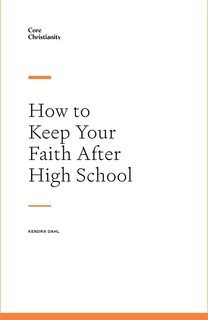Really, every parent should memorize this verse. Every human, in fact. But Mother’s Day is upon us, and we may be tempted to evaluate our performance as mothers, to rate our ability to celebrate and be celebrated in terms of our successes and failures. As we do that, I want to offer a word of hope to myself and to any mother who feels the weightiness of the task before us:
But he gives more grace. (James 4:6a)
This verse is found in the middle of some warnings and pleas for wisdom. James describes the power of the tongue to destroy (James 3:1–12). He warns against our selfish ambition and adulterous, worldly passions that lead to conflict and turmoil (James 3:14–16, 4:1–4). He calls us to wisdom that’s meek and pure, the fruit of which is gentleness and mercy, righteousness and peace (James 3:13, 17–18). All believers—parents included—should take to heart these warnings and admonitions. We ought to confess our failures and beg the Lord for wisdom, which he promises to give generously (James 1:5). But, lest we despair as we reflect on our ability to live up to this standard, James interrupts himself with this good news, for us and for our children: “But he gives more grace.”
The Weight of Motherhood
When my first daughter was born, I was shocked that the doctors were going to let me take her home. As they placed her in my arms, the weight of my ineptitude settled on my shoulders.
Motherhood is weighty. As we look at these vulnerable humans entrusted to us, it’s tempting to feel like we hold the power of life and death, floundering or flourishing. It’s no wonder we don’t feel fit for the task and are plagued by a sense of constant failure.
As my children grow older, the weightiness of my role as a mother has returned with a vengeance. I see my kids starting to wrestle with big life issues; I see how God is shaping them into the adults they will become; I see the years slipping away and realize how soon they’ll be off on their own. And I see the ways my failures are manifested in their behavior—how they can be harsh and impatient with each other, rude and dismissive, selfish and irritable. I wish I could say I don’t know where they learned these things, but I know exactly where they learned them. I share their sinful condition, and I often fear I’m doing more harm than good.
But He Gives More Grace
One evening about 10 years ago, after spending the day frustrated with my three small children, I replayed my maternal failures as I collapsed on the couch beside my husband. I bluntly informed him, “I’m ruining our children.”
My husband took a deep breath, lifted my head, and looked me square in the eyes. He assured me I wasn’t ruining our children—not because I had my failures wrong, but because God is abundantly gracious. He joked about how I make peanut butter sandwiches—so filled with peanut butter and jelly that each bite has delicious sticky goo leaking onto your fingers. That’s how God’s grace is, he told me. Like an extra layer of peanut butter, making sure everything is covered. As silly as it may sound, the image stuck. On the worst of days, I tell myself, “But he gives more grace,” and then I picture my kids covered in peanut butter.
The fact is, our hope for our children isn’t in our perfect parenting, but in God’s abundant grace. His love for them far outweighs ours; his plan for them is good and wise and perfect; and no matter how much we fail—no matter how far they may drift—his grace never runs out. We don’t have the power to ruin them, and we don’t have the power to make them into the humans we wish for them to be. Just as we carry them forward as infants to the baptismal waters, demonstrating that God’s grace is for the helpless and needy, so this helplessness stays with us throughout our lives. We never outgrow our need for God’s grace.
Grace for Mothers
My husband wasn’t finished with me that night I sat on the couch with my head in my hands. “Repeat after me,” he said: “I am not ruined.”
This is the thing, isn’t it? Motherhood feels so weighty because we know our fears are founded. We’re not fit for the task. We will fail. Our sin and suffering will wound our children.
My husband had the intuition that night to see that my fears were rooted in my own untethered identity. I feared I would send my children floundering because I was floundering. I was trying to make up for my sinful past, measuring my worth in my ability to be a kind and patient mother, to produce obedient and pleasant offspring. Every misspoken word, every burst of anger, and every act of disobedience (theirs and mine) only solidified what I believed about myself—that I was a failure, that I had no business trying to raise these children, that they were going to end up just like me.
But this verse isn’t just for our children, it’s for us too.
Parenting as the Chief of Sinners
The apostle Paul felt like a father to those for whom he was a pastor, preacher, mentor, and friend (1 Cor. 4:14–17). He called his “children” to learn from his example—to imitate him as he imitated Christ (1 Cor. 4:16, 11:1; Phil. 3:17). This is an intimidating parental example until we recognize how Paul saw himself: “The grace of our Lord overflowed for me with the faith and love that are in Christ Jesus,” he writes,
. . . Christ Jesus came into the world to save sinners, of whom I am the foremost. But I received mercy for this reason, that in me, as the foremost, Jesus Christ might display his perfect patience as an example to those who were to believe in him for eternal life. (1 Tim. 1:14–16)
The Lord gives more grace—overflowing grace—for sinful mothers. For mothers who have wounds from their pasts that sometimes come out sideways. For mothers who aren’t sure if they can make it one more day trying to advocate for their child’s special needs, or who can’t bear the thought of letting their foster child return to their broken home, or whose adult children have wandered from their faith. For mothers who feel lost in a sea of needs and demands and messes, the Lord gives more grace.
And as he pours out his abundant grace on those mothers, he provides an example of his perfect patience for those kiddos who watch—as their moms fall to their knees in prayer, as they humbly admit their desperate need, as they ask for forgiveness for the 100th time, and as they keep walking in the way of Christ, imperfect as it may be.
This Mother’s Day, rather than trying to number your successes or feeling shame over your failures as a mom, may you cling to this hope for you and for your children: “But he gives more grace.”






